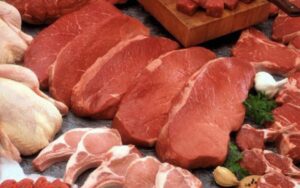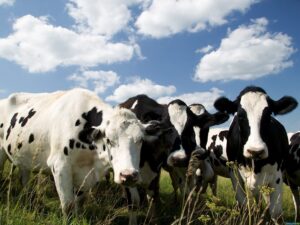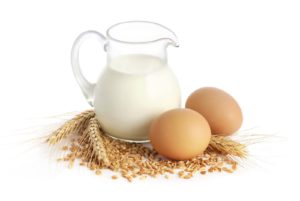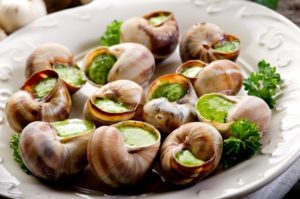
The State Service of Ukraine for Food Safety and Consumer Protection and Ministry of Foreign Affairs of Ukraine in 2022 agreed 22 forms of international veterinary certificates for exporting animal products to 12 countries.
As follows from the agency’s press release issued on Monday, last year the market was opened to Albania for semi-finished meat from Ukraine; to Georgia for snails; to Dominica for milk and dairy products; to Israel for ornamental freshwater fish, live rabbits, chewed pet items, fresh and treated skins and hides; to Canada for poultry meat and products; to Kenya for milk and dairy products.
In addition, export of Ukrainian chewed pet items, raw and canned pet food to Northern Macedonia, pet food to Singapore; hatching eggs, canned and processed pet food to Serbia; processed animal protein products (not for human consumption) and fish products to Turkey, table eggs to Pakistan, and meat products and semi-finished products to Montenegro is permitted.
Gosprodpotrebtsluzhba also stressed that in 2022 to 432 increased the number of enterprises-producers of animal products with the right to export their products to the EU, which is 53 more than it was at the beginning of 2022. By comparison, for 2021, 23 businesses received such a right.
“This positive dynamics in increasing the number of Ukrainian exporters to the European market is extremely important in the context of Ukraine’s status as a candidate country for accession to the European Union. The work in this direction will continue permanently and if the requirements of the Association Agreement with the EU are fulfilled as part of our obligations to join the European Union, this number will increase daily”, – the agency summarized in a press release.

The rate of value added tax (VAT) on livestock products, rye, oats, flax seeds and sugar beets, reduced from the beginning of the year to 14%, will be returned to the level of 20%.
An Interfax-Ukraine correspondent has reported that the Verkhovna Rada adopted bill No. 5425-d on Thursday with 309 supportive votes with the required minimum of 226 votes.
The 20% rate will again apply to products with tariff heading 0102 (live cattle), 0103 (live pigs), 0104 10 (live sheep), 0401 (in terms of whole milk), 1002 (rye), 1004 (oats), 1204 00 (flax seeds), 1207 (seeds and fruits of other oilseeds), and 1212 91 (sugar beet).
At the same time, with respect to other grains and oilseeds, the VAT rate remained 14%. In particular, these are goods with codes according to tariff heading 1001 (wheat and meslin), 1003 (barley), 1005 (corn), 1201 (soybeans), 1205 (rape seeds) and 1206 00 (sunflower seeds).
As the head of the specialized agrarian committee Mykola Solsky said earlier, the idea of lowering prices and reducing tax violations at a reduced rate of 14% did not work for livestock products. The adopted bill is aimed at promoting the stability of the price situation in the relevant commodity markets, as well as creating equal and fair conditions for VAT taxation for agricultural producers and enterprises of the processing industry.

Ukraine has agreed on the veterinary certificates for exporting livestock products to Qatar, the press service of the State Service of Ukraine for Food Safety and Consumers’ Rights Protection has reported. According to the report, the states approved the forms of certificates for exporting meat and meat products (in particular, poultry and beef), milk and dairy products, shell eggs and egg products, fish and fish products, as well as processed food from Ukraine to Qatar.
As reported, Ukraine agreed on certificates for the export of dairy products to Bosnia and Herzegovina and to Oman, as well as for the export of beef to Saudi Arabia.
In 2018, Ukraine opened 85 export markets for various types of products and increased the number of enterprises that received the right to export food products of animal origin. A total of 126 producers of the country can export food products to EU countries.
EXPORTING, LIVESTOCK PRODUCTS, QATAR, VETERINARY CERTIFICATES

Ukraine has updated the requirements to import of animals and livestock products, the press service of the State Service of Ukraine for Food Safety and Consumers’ Protection has reported.
According to the report, Ukraine introduces the principle of zoning, when the import of livestock products is allowed from some zones, if not the entire territory of the country is free from animal diseases. Also, the new rules provide for a smaller number of diagnostic studies of live animals on the territory of the exporting country, which will reduce the financial burden on the importing company.
In addition, the requirements for the food producer have been eliminated, so that raw materials originate exclusively from the territory of the exporting country, and new categories of products are added. In particular, the requirements for the import of gelatin, collagen, colostrum, frog legs, snails and another 33 products were set.
According to the press service of the food service, the Ministry of Agricultural Policy and Food approved the relevant resolution in November 2018, and the Justice Ministry registered it on April 4, 2019. The resolution comes into force six months after publication.
CONSUMERS' PROTECTION, FOOD SAFETY, IMPORT, LIVESTOCK PRODUCTS, REQUIREMENTS